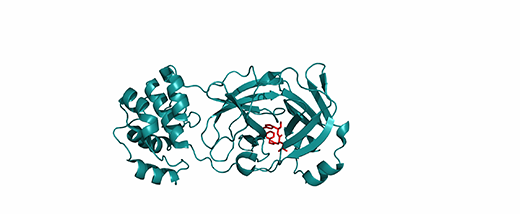Kansas State University veterinary medicine researchers pave way to identify antiviral treatment for deadly infectious cat disease
Friday, April 8, 2016

An antiviral compound, shown in red, is bound to coronavirus protease, shown in teal. Coronavirus protease plays an essential role in virus replication. The compound inhibits the function of viral protease by binding to the active site leading to failed virus replication. | Download this photo.
MANHATTAN — A new research project in the College of Veterinary Medicine at Kansas State University has been successful in treating a deadly cat disease that has previously been nearly 100 percent fatal.
Yunjeong Kim, an associate professor in the college's diagnostic medicine and pathobiology department, has worked with collaborators in diverse fields to develop an antiviral compound for feline coronavirus associated with feline infectious peritonitis, more commonly known as FIP.
Her article, "Reversal of the Progression of Fatal Coronavirus Infection in Cats by a Broad-Spectrum Coronavirus Protease Inhibitor," has just been published in the journal PLOS Pathogens.
"FIP is caused by coronavirus infection," Kim said. "Coronavirus infections are very common among cats. However, in most cases, these viral infections cause mild and self-limited enteritis or no symptoms. But some cats will develop a fatal disease which is FIP."
Kim said FIP is usually found in young cats that are less than 2 or 3 years old.
"FIP arises from certain viral mutation that occur in the infected cats and failure of host immune system to contain such mutated viruses," Kim said, adding that the pathogenesis of FIP is primarily immune-mediated; it is the host immune response to virus infection that causes disease in the affected cats.
"FIP occurs in two major forms: effusive, or wet form, or non-effusive, dry form," Kim said. "The wet form is more common and is characterized by an accumulation of fluids in the abdominal area or chest cavity. Symptoms may include antibiotics unresponsive fever, jaundice, bodily effusions and weight loss. Once typical clinical symptoms develop, they progress rapidly resulting in death or euthanasia in weeks to months."
Since FIP disease progression is rapid and the pathogenesis of FIP is primarily immune-mediated, it has been unknown whether antiviral drug treatment alone can be effective at reversing disease progression in an infected cat. The results of the study showed that inhibiting viral replication is the key to the treatment of FIP.
"This is the first time we showed experimental evidence of successful treatment of laboratory cats at an advanced clinical stage of FIP," Kim said.
Since FIP is a deadly disease, there have been many efforts to develop effective treatments for it, but none has been successful.
"The knowledge gained from this study is a step forward to understanding the pathogenesis of FIP and other coronavirus infections important in humans and animals," Kim said. "Also, since it is the first report on the effective antiviral drug for coronavirus infection in a natural host, it has implications for developing effective treatment measures for other coronavirus infections, including human coronaviruses."
One of coronavirus infections that shares similar characteristics with FIP is Middle East respiratory syndrome, or MERS, virus. MERS is an emerging coronavirus infections in humans, which was first identified in 2012 in Saudi Arabia, and there is no available effective treatment for coronavirus infection in human or animals.
"Our antiviral compounds are also effective against other coronaviruses in cell culture, including MERS coronavirus, and we are currently working on further optimizing them for other coronaviruses," Kim said.
Kim has been working with a multidisciplinary team to develop protease inhibitors for FIP. Niels Pedersen, University of California, Davis, tested the efficacy of the antiviral compound on a small group of infected cats. He and Kim have been working together since 2013. William Groutas, Wichita State University, and Duy Hua, Kansas State University, both medicinal chemists, and Kyeong-Ok Chang, Kansas State University, a virologist, have been working together since 2010 to develop antiviral compounds for various viruses.
"The next step will be finding out how effective this antiviral treatment is for cats with naturally acquired FIP showing various clinical symptoms," Kim said. "We received funding from Morris Animal Foundation to conduct a clinical trial on cats with naturally acquired FIP and viral resistance study."
The current published work has been funded by NIH, Winn Feline Foundation, Morris Animal Foundation and the Global Food Systems program at Kansas State University.
